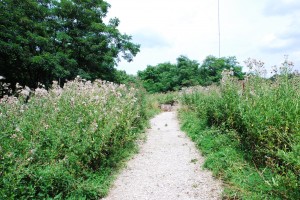 One of the things that I’ve been trying to do more is write about my spirituality. Since writing, for me, is an intensely spiritual and often cathartic experience, writing about my spiritual journey should be a seamless task. *Should* is a funny word. Because it’s not easy. What *should* be easy is not.
One of the things that I’ve been trying to do more is write about my spirituality. Since writing, for me, is an intensely spiritual and often cathartic experience, writing about my spiritual journey should be a seamless task. *Should* is a funny word. Because it’s not easy. What *should* be easy is not.
Quite the opposite, writing about my spirituality is difficult. I’m often hesitant and intimidated at the thought. Spirituality now is such a hard topic to address. It’s as if you have to write generally to make an agreeable point sometimes and since my spirituality shares significant space with my Catholic beliefs – and since Catholicism is so controversial in the faith and feminist debates – I take pause when the urge to write about God comes. After all, deep conversations about the intangible, unseeable world is hard to discuss in person, let alone express to a screen of faceless readers.
Which is why I started reading “Things Seen and Unseen: A Catholic Theologian’s Notebook.” It was floating around the office, a Christmas gift that took a hot potato turn from one set of hands to the next. No one seems interested in reading it. Then it landed in my hands. It’s essentially the quick and private thoughts of a Notre Dame professor who puts down on page the things that capture his attention: memories, ideas, epiphanies, quick thoughts. All theologically framed, some hard to understand, but strangely interesting.
I often read books that will serve as a psychological trampoline; something for me to bounce from. Ideas from a gifted and articulate spiritual educator seems like a good place to start. I can’t promise revelations. I can’t guarantee provocative questions. What I can promise is a genuine and honest response to questions I have struggled with for what seems like eternity:
Who am I and who is God? How are we connected? What reveals God to me and what is God communicating to me and me alone? Where am I and where is God?
These seem to be the rotary of questions begoggling my soul. The pieces of social injustices, suffering, death and dying, miracles, prophesy, church as institution, sin, redemption…all these other issues which fascinate me are veiled by the curtains of much larger questions or origin and identity. These are questions that I know, deep down, somewhere in a quiet space where verbal language is not my primary means of communication, that these questions shall remain with me until the day I die. But I think there’s more purpose and meaning to life when we approach our questions as if they were meant to be answered by the life and earth surrounding us now. Today. And like a voracious and relentless investigator – I must know the truth. Or, at the very least, know that I am trying to live in a way that reveals its depth to me.
So, here we go…